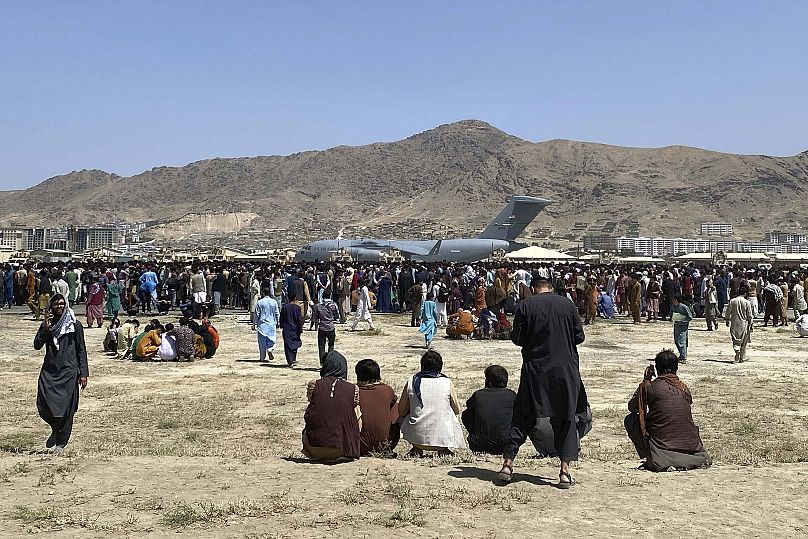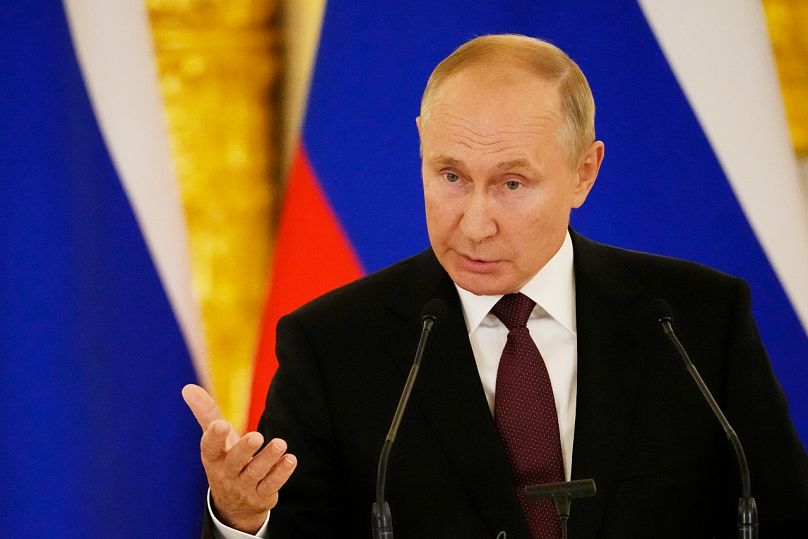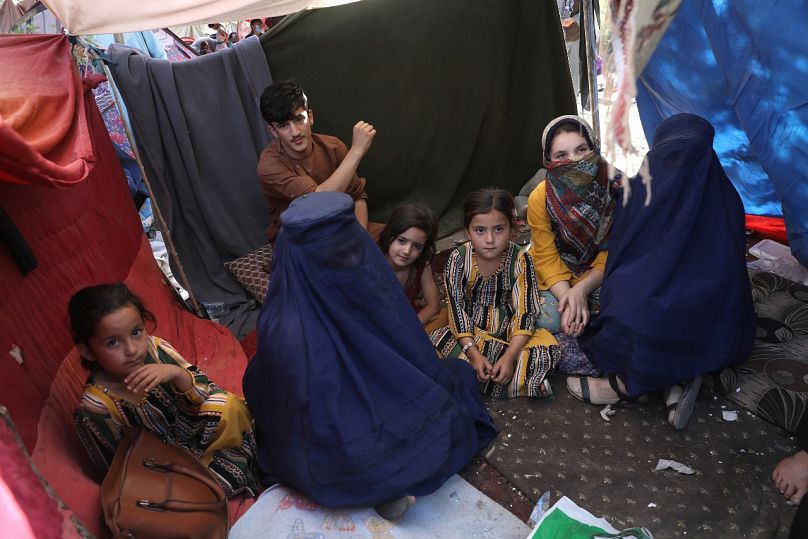Euronews' Masoud Imani Kalesar looks at the small print in Afghanistan's recent history to give us some ways to understand the recent developments.
The US Marshall Plan worked well for rebuilding post-WWII Europe with just $204.66 billion in today’s money. Following 9/11, Washington spent more than $2 trillion on the war in Afghanistan in two decades.
 ADVERTISEMENT
ADVERTISEMENT
 ADVERTISEMENT
ADVERTISEMENT
About $83 billion of that money went for building and arming the Afghan army. In other words, the US spent $300 million dollars per day. Yet it did not work. Despite some heroic resistance, many Afghan soldiers and commanders fled before the cities began to fall one after another. Finally, on 15th August 2021, President Ashraf Ghani along with high-ranking officials fled the country, and the Taliban entered the capital, Kabul, victorious and at ease, without firing a single bullet. How could it happen so easily and rapidly? Here are five elements that can help explain it.
Deep-routed battle-hardened Taliban and Islamism
Some anti-Taliban Afghans would argue the fundamental Taliban fighters are exported from Pakistan and are not deep-rooted in Afghanistan. Not quite true. Religion and Islamism are deep-rooted in Afghanistan. The Taliban has harvested the fruit of it in a society in which 60% of its 37 million population are illiterate and 74% living in rural areas. The group has a strong base amongst those as well as amongst the army and police personnel who would have viewed Taliban fighters as the ‘true believers and Muslims’, thus avoiding shooting them and even collaborating with them.
Before the Taliban regained power in 2021, many of them had first fought with the Soviet Red Army, then against other Mujaheddin during the civil war till their sizer of power in 1996. Their Islamic Emirate fell apart in 2001 with the US invasion of Afghanistan following the 9/11 attacks and by refusing to hand over Osama bin Laden to the US. They continued to fight the US, forced them to the negotiation table in Qatar, and finally emerged the winner following the ‘war of cities'.
Morale, belief, and a pair of US Army boots
More than 300,000 Afghan army men were equipped with advanced US rifles but not with morale. For years they have been plagued by corruption and payoffs and above all a sense of betrayal by the government and officials, the majority of whom were corrupt and taking care of their pockets and clans rather than the nation. Some 13 years ago an Afghan friend of mine gifted me a pair of US-army boots bought from a middle-man in front of the Bagram Airbase, apparently in exchange for Afghan hashish and directly from a US soldier or from an Afghan army official.
An ignored soldier won't fight under a corrupt commander or leadership. The Afghan government was never a unified one. Power in the Capital was divided between Ghani and Abdullah Abdullah clans. In contrast, the Taliban were unified in the name of ‘fundamental Islam’ for which they had fought for 40 years and were giving their lives for it by suicide missions.
A Trump-Biden gamble
Donald Trump started with a bad hand, Joe Biden played it in the worst manner possible. Trump bestowed the Taliban with political recognition by directly negotiating with the group, sidelining and forcing the Afghan government to free more than 5000 Taliban fighters from prisons. Biden put the last nail on the coffin of the Afghan government and army by the so-called “orderly withdrawal” of US forces. Apparently, the US has believed that the Taliban: won't go against the US interests, won't let Afghan soil be used against Americans, won't harbor al-Qaeda, and will be ‘softer’ than in the 90s -when they were ruling the country - on women and human rights. Most probably, behind the closed doors of so-called peace negotiations in Qatar, there has been more ‘give & take’ between the US and the Taliban, yet to be revealed and declassified.
Clans over motherland
My first encounter with Afghans was not with one of the 3.5 million Afghan refugees in Iran, my motherland, but in India where I was a student. I noticed the smart and brilliant men, later becoming high-ranking young officials in Kabul almost overnight, had one thing in common: their loyalty was not to the ‘nation-state’ in the first place but to their ethnic, clanship or linguistic affiliations. Strong loyalty to ethnic groups of Pashtun, Tajik, Hazara, Uzbek, etc., plus regionalism and clannism are the prime Achilles’ Heel of Afghans.
International Relations
The US interest was clear-cut: to end its longest war and ‘bring the boys home’ at any cost, including dealing with the Taliban. Pakistan, on the other hand and for a long time has played the cards of ‘Taliban’ and ‘fighting extremism’ for the sake of US financial benefits. Islamabad has long defined its Afghanistan doctrine to counterbalance its sworn enemy, India, from influencing and having a footprint in Afghanistan. Islamabad would adopt further support of the Taliban if need be. That's why the peace in Afghanistan is dependent on reconciliation between two nuclear neighbours, Pakistan and India.
On the other hand, Russia, China and Iran enjoyed showcasing the diminishing US influence in the region by hosting some of the Taliban’s leaders in Moscow, Beijing and Tehran. With a lessening US influence and withdrawal of Western forces from Afghanistan as well as the weakening government in Kabul, all three allies saw an opportunity with the Taliban. Indeed, the anti-American alliance of Moscow-Beijing-Tehran contributed to the downfall of Kabul by the implicit endorsement of the Taliban. All three countries’ embassies are functioning now in Kabul while many others have evacuated their staff.
Would all three plus a few more countries such as Saudi Arabia recognise and do business with the ‘new Taliban’? Most probably yes, if the Taliban establishes a degree of stability, law and order. The European Union, however, will remain sceptical of ‘pragmatic radicals’ who are trying to assure the West that they are a ‘new Taliban’ who respect human rights, specifically those of Afghan women.
And finally, a coda:
Does the only hope of an Anti-Taliban faction lie hidden in the northern mountains?
The main government officials have fled Afghanistan. Ex-President Ghani is in the UAE, Abdul Rachid Dostum is in Uzbekistan and some others have taken shelter in Turkey. A few have remained outspoken opting to stay inside Afghanistan; namely Amrullah Saleh, former Chief of Intelligence and ex-Vice President, and Ahmad Massoud the son of legendary Commandant Ahmad Shah Massoud. They have taken refuge in the Panjshir valley, hoping its high mountains in the north of Afghanistan would protect them and their ‘Resistance Front’, the mountains that protected Commandant Massoud and the Northern Alliance from the Red Army and later from the Taliban. Panjshir never fell and it remains the only region so far not under the rule of the Taliban.
But the hope of resistance is dim. Afghans exhausted by 40 years of conflict do not want to fight yet another civil war, and currently no world or regional power is willing to extend military and financial support to the Resistance Front for the sake of ‘a free Afghanistan’ or even in the name of ‘fighting fundamentalism’. It seems the only factor that might alter the current scenario in favour of the anti-Taliban faction would be the behaviour of the Taliban in Kabul, i.e. if they take extreme measures against Afghans' basic human rights, forcing the United Nations and the world community to react.













